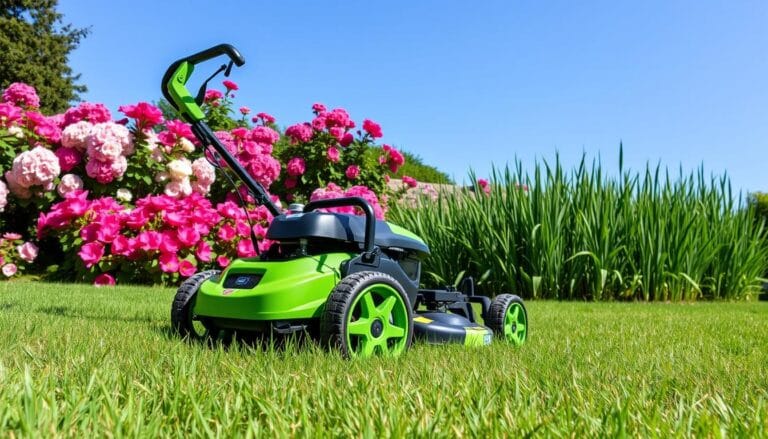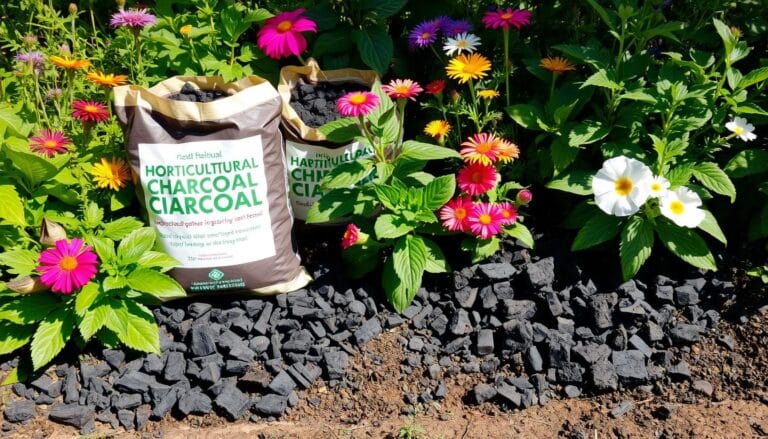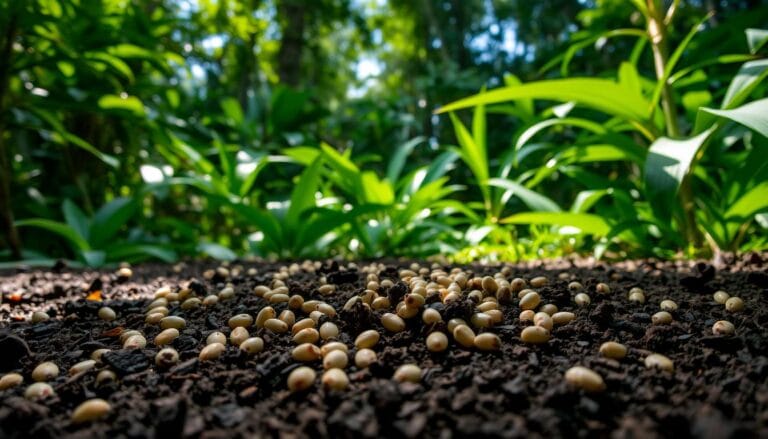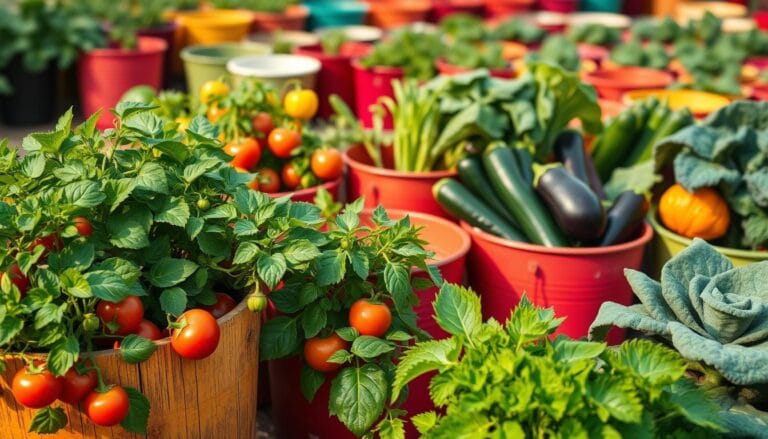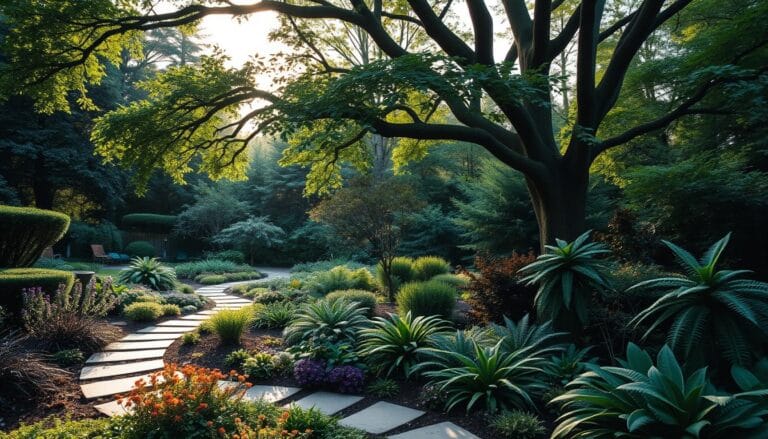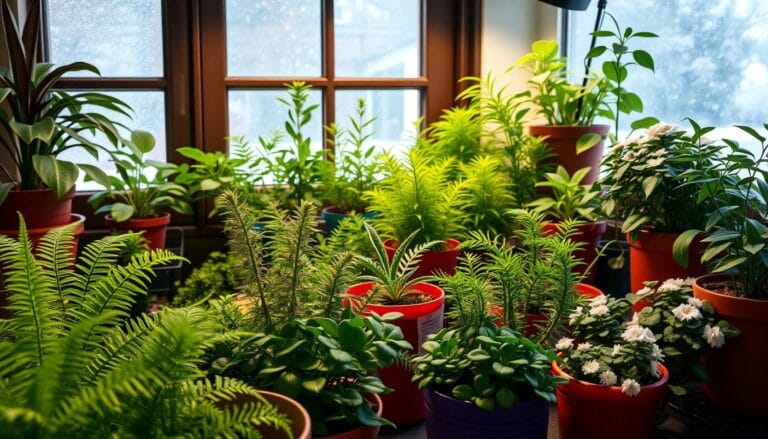Plants in jungles with broad green leaves
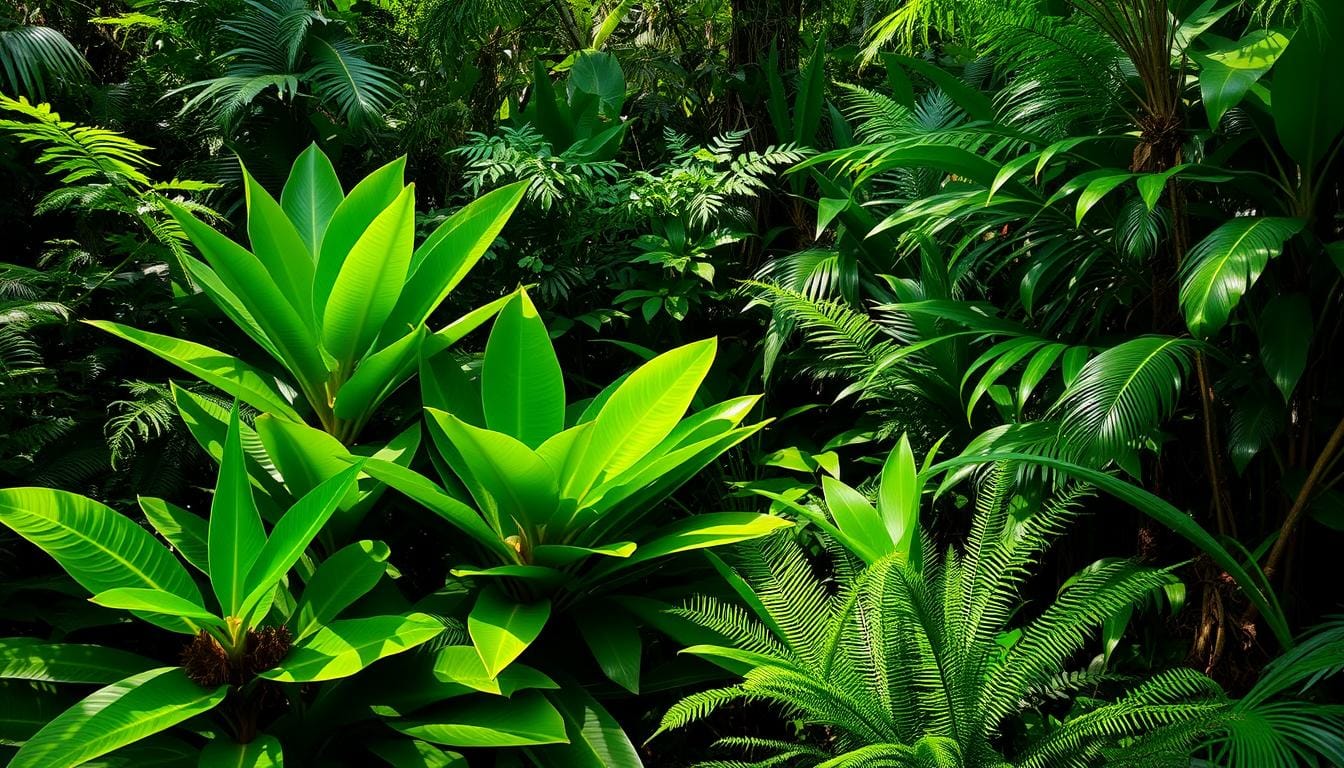
As I step into the Amazon Rainforest, I’m amazed by the variety of plants. The broad, green leaves move softly in the air, creating a lively atmosphere. This area, home to over 80,000 plant species, shows nature’s endless creativity.
The rainforest is full of towering trees and delicate vines. These plants, suited to the tropical climate, are key to the ecosystem’s health. They help keep the rainforest’s life cycle going strong.
Table of Contents
Understanding the Amazon Rainforest’s Plant Diversity
The Amazon Rainforest is a lush paradise, filled with a wide variety of plants. It’s known for its plant diversity, playing a key role in the ecosystem. Broad-leaved plants help support the tall trees by forming a network of lianas in the shallow soil.
Ecological Importance of Broad-Leaved Plants
Broad-leaved plants are the base of the Amazon’s food web. They catch sunlight in the dense canopy, feeding many animals. Their breakdown on the forest floor also helps the soil, supporting the growth of this vibrant ecosystem.
Climate and Growing Conditions
The tropical climate of the Amazon is perfect for plants to grow all year. The high humidity and steady temperatures allow a wide range of plants to thrive. Each species is adapted to the unique growing conditions of the rainforest.
Plant Adaptation Mechanisms
Amazon plants have clever adaptation mechanisms to survive and grow. They have large leaves to catch sunlight and special structures for water and nutrient absorption. These adaptations show the amazing resilience of Amazonian plants.
“The Amazon Rainforest is home to over 80,000 plant species, showcasing an incredibly high level of biodiversity.”
The Amazon Rainforest is the world’s largest and most diverse tropical rainforest. It amazes and inspires us with its plant diversity. Learning about the ecological importance, climate, and adaptations of its plants is key to protecting this natural wonder for the future.
Most Common Broad-Leafed Plants in Tropical Jungles
The lush, tropical jungles are full of amazing plants. Each one has special traits and ways to survive. You’ll find the Brazil Nut Tree, Cocoa Tree, Heliconia, Orchids, Passion Flower, and Giant Water Lily.
These plants have big, green leaves that help them live in the jungle. For example, the Brazil Nut Tree can grow up to 50 meters tall. It’s important for the rainforest because it works with pollinators and seed dispersers.
Looking at these plants shows us how they adapt and help the jungle. They make the tropics beautiful and show how everything is connected in the jungle.
From the tall Brazil Nut Tree to the stunning Giant Water Lily, these plants show nature’s strength and beauty. Learning about them helps us see why we must protect these plants and their homes.
Exploring Plant with Pink and Green Leaves in Jungle Environments
In the lush jungles, plants with pink and green leaves catch the eye. These plants, often from the Caladium genus, are loved for their beauty and ability to grow in the tropics.
Caladium Species and Varieties
Caladiums are a diverse group of plants with many leaf patterns and colors. The Caladium ‘Pink Blush’ has bold, heart-shaped leaves. The Caladium ‘Strawberry Star’ has delicate, speckled leaves. Each variety shows off its own mix of pink and green, making them perfect for jungle gardens.
Care Requirements for Variegated Foliage
To keep Caladiums and similar plants looking vibrant, they need the right care. They do best in bright, indirect light. They also need the right amount of moisture, humidity, and nutrients in the soil to stay healthy.
Decorative Uses in Landscaping
The pink and green leaves of these plants are highly sought after. Caladiums and other plants with variegated leaves are used to add beauty to gardens. They work well in containers, beds, or as accent plants, making any garden more stunning.
| Plant | Light Requirements | Soil Needs |
|---|---|---|
| Pink Prayer Plant (Maranta leuconeura ‘Erythroneura’) | Bright, indirect light | Well-draining soil |
| Chinese Evergreen (Aglaonema ‘Pink Dalmatian’) | Tolerates lower light conditions | Well-draining soil |
| Pink Polka Dot Begonia (Begonia maculata) | Bright, indirect light | Well-draining soil |
Giant Leaves: Iconic Jungle Plants
The Amazon Rainforest is full of plants with huge leaves. These leaves are symbols of the tropical jungle. They make the jungle look lush and green. They also play key roles in their ecosystems.
The Giant Water Lily (Victoria amazonica) has leaves up to 46 centimeters wide. They can hold up to 136 kilograms. Its leaves float on water, catching sunlight for photosynthesis.
Heliconia and Banana plants have big, paddle-like leaves. Even though they’re not trees, their stems are mostly water. This makes the jungle look like a lush paradise.
These leaves do many things. They shade and cool the area. They also collect water during rain. Their size shows the jungle’s amazing adaptations and diversity.
| Plant | Leaf Size | Unique Features |
|---|---|---|
| Giant Water Lily (Victoria amazonica) | Up to 46 cm in diameter | Can support weights up to 136 kg |
| Heliconia species | Paddle-like, large | Herbaceous stems contain up to 93% water |
| Banana plants | Broad, large | Herbaceous stems contain up to 93% water |
These giant leaves are not just beautiful. They’re also vital to the jungle’s balance. This shows why we must protect these plants.
Variegated Jungle Plants and Their Characteristics
The lush tropical jungles are home to a wide variety of plants. These plants have leaves with amazing colors, patterns, and textures. They make any indoor or outdoor space more interesting.
Types of Variegation
There are many types of variegation in jungle plants. You can see sectoral patterns, splashes of color, and leaves of different colors. The Monstera deliciosa ‘Albo variegata’ and the Philodendron Birkin are just a few examples.
Growing Conditions for Variegated Species
Variegated plants need specific growing conditions to keep their colors bright. They need bright, indirect light to keep their patterns. Watering, humidity, and fertilization also play important roles in their health.
Common Problems and Solutions
Variegated plants can face challenges like leaves turning solid green. This can be fixed by adjusting the light or pruning. With careful care, these plants can stay vibrant and healthy.
| Variegated Plant Species | Growth Habits | Variegation Patterns |
|---|---|---|
| Monstera deliciosa ‘Albo variegata’ | Can grow up to 6-10 feet indoors | Distinct white or cream-colored patches on green leaves |
| Philodendron Birkin | Typically reaches 2-3 feet tall | Unique striped pattern of green and white/cream |
| Caladium | Can grow up to 3 feet tall and 2 feet across | Vibrant combinations of pink, red, and green hues |
“Variegated plants add a touch of enchantment to any jungle-inspired setting, captivating the eye with their mesmerizing color patterns and textures.”
Ornamental Value of Broad-Leaved Tropical Plants
Broad-leaved tropical plants are loved for their beauty, making them great for indoor jungles and adding flair to spaces. Plants like the Marble Queen Pothos, Silver Satin Pothos, and Calathea orbifolia stand out with their unique leaves. These ornamental plants add a special touch to any area.
These tropical decor plants are also easy to take care of. Their lush, indoor jungle-like look can change a room. It brings a calm and natural beauty inside.
- Variegated plants may grow more slowly than their true green relatives.
- Viruses and deficiencies can cause localized variations in variegated plants.
- Variegation is two or more colors on a single leaf resulting from random mutations, genetics, and natural variations.
These plants are more than just pretty. They can also clean the air, making spaces healthier. Plus, they grow well in many conditions, from shade to full sun. This makes them perfect for many places.
“Broad-leaved tropical plants add a touch of the exotic to any space, transforming ordinary rooms into lush, indoor jungles that captivate the senses.”
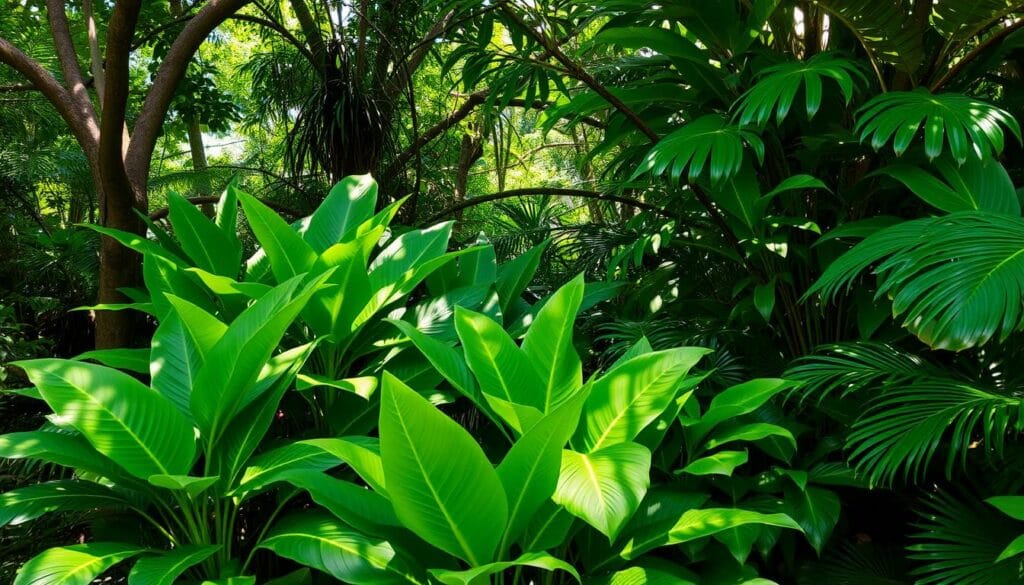
If you want to bring a tropical decor vibe or just some natural beauty to your space, these plants are ideal. They’re easy to care for, clean the air, and look amazing. They’re a must-have for anyone who loves plants or wants to add style to their home.
Shade-Loving Jungle Plants for Indoor Gardens
Many tropical plants from the jungle do well indoors, especially those that love shade. These shade-loving plants bring a lush, exotic feel to your home. They also need less care than plants that love the sun.
Light Requirements
Choose indoor gardening plants from the jungle that prefer shade. Some great picks include:
- Peace Lily (Spathiphyllum wallisii) – loves full to partial shade and can grow up to 6 feet tall.
- Aglaonema ‘Silver Bay’ – does well in bright, indirect light and can handle lower light.
- Various Philodendron species – do great in partial shade and can grow big indoors.
Humidity and Temperature Needs
These tropical houseplants from the jungle also need more humidity and steady temperatures. To care for them right, keep them moist and avoid big temperature changes.
By picking and caring for these shade-loving jungle plants, you can create a lush, verdant rainforest in your home.
“Bringing the jungle indoors allows you to enjoy the beauty and tranquility of nature, even in the heart of the city.”
Conservation and Protection of Jungle Plant Species
Protecting plant species in tropical jungles is key for keeping biodiversity and balance. Rare plants like the Brazilian Mahogany face threats from deforestation and climate change. Efforts aim to save these habitats, control endangered species trade, and use forests sustainably.
Keeping tropical jungles’ plant life safe is vital for animals that rely on these plants. The Amazon Rainforest is home to towering Kapok trees and colorful Heliconias. These plants are unique and essential for jungle ecosystems.
Initiatives like national parks and reforestation are crucial. They help protect endangered species by planting native plants and restoring habitats. This ensures the Amazon’s plant biodiversity thrives for the future.
Local communities are also key in plant conservation. They know the environment well and use plants for medicine. Education and awareness campaigns are vital to get public support for protecting these resources.
“The Amazon rainforest houses approximately 10% of all known plant species, showcasing an unparalleled diversity in plant life.”
Protecting jungle plant species is essential for our planet’s future. By working together, we can safeguard these ecosystems. This ensures the health and diversity of our world.
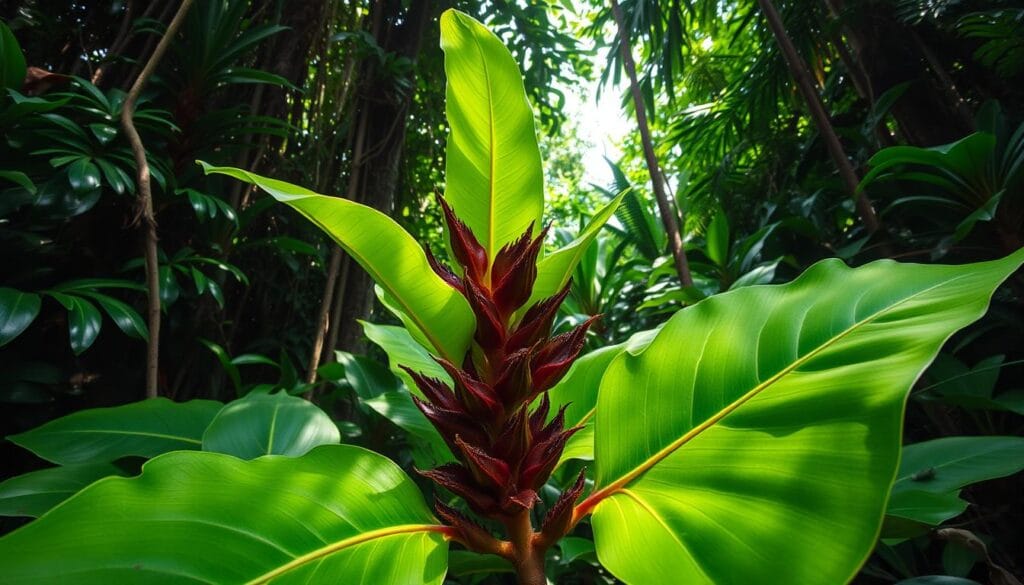
Conclusion
Tropical jungles are home to a wide variety of plants with broad green leaves. These plants are crucial for the health and diversity of these ecosystems. From the easy-to-care-for Aglaonema Pink Sunset to the stunning Philodendron erubescens ‘Marble’, they are both beautiful and important.
It’s important to know how to care for these plants. This includes understanding their light and water needs. This knowledge helps us appreciate and protect the rich plant life of tropical jungles, whether in nature or in our homes.
Looking at a giant water lily or a Pink Princess Marble plant shows the amazing diversity of nature. By learning about their needs and protecting these species, we help keep these ecosystems healthy and vibrant. This is important for future generations.
As we approach September 24, 2024, this article provides a detailed guide to these jungle plants. It’s useful for both experienced plant lovers and newcomers to tropical foliage. This knowledge helps us care for and appreciate the plants that make these ecosystems so lush and vibrant.
FAQ
What is the plant diversity in the Amazon Rainforest?
What is the role of broad-leaved plants in the Amazon Rainforest ecosystem?
What are some common broad-leaved plants in tropical jungles?
What are plants with pink and green leaves, and how are they used in tropical environments?
What are some examples of plants with impressively large leaves in the Amazon Rainforest?
What are the characteristics and care requirements of variegated tropical plants?
How are broad-leaved tropical plants used for ornamental purposes?
What are some examples of shade-loving tropical plants that can be grown indoors?
Why is the conservation of jungle plant species important?
Source Links
- The 29 Most Fascinating Plants in the Amazon Rainforest – https://tourthetropics.com/guides/most-fascinating-plants-in-the-amazon-rainforest/
- Best 18 Amazon Rainforest Plants & Flowers (Updated) | BioExplorer – https://www.bioexplorer.net/amazon-rainforest-plants.html/
- Rainforest – https://education.nationalgeographic.org/resource/rain-forest/
- Diversity of Amazon Rainforest Plants in Manu – Machu Picchu Amazon Peru – https://machupicchuamazonperu.com/diversity-of-amazon-rainforest-plants-in-manu/
- Amazon Rainforest | Plants, Animals, Climate, & Deforestation | Britannica – https://www.britannica.com/place/Amazon-Rainforest
- 21 Garden Plants With Pink Leaves – https://www.epicgardening.com/plants-pink-leaves/
- 20 Gorgeous Tropical Houseplants That Actually Thrive Indoors – https://www.housebeautiful.com/lifestyle/gardening/g44446503/tropical-plants/
- 13 Big Leaf Houseplants That Make a Statement – https://www.thespruce.com/big-leaf-plants-5101252
- Top-pink-indoor-and-outdoor-plants – The Jungle Collective – https://www.thejunglecollective.com.au/pink-indoor-oasis-and-outdoor-escape-plants/?srsltid=AfmBOoqatp3fnlwxL2qYK1qmXCZ06qDgEFDJNJ7DMvkXyJ5WXxt-cEKv
- Forest Wildflowers – Pink/Red/Purple – Mount Rainier National Park (U.S. National Park Service) – https://www.nps.gov/mora/learn/nature/forest-wildflowers-red.htm
- All About Desert Plants for Landscaping – Includes our Top 40 Best Desert Plants for your Garden – https://planetdesert.com/blogs/news/desert-plant-for-landscaping-design-care-guide?srsltid=AfmBOooxCakouqBKnWm69S4h2wJkv5aO9ghbBC0IuUYta0aUfBLa4kaX
- 8 Pink Plants for Your Houseplant Collection – https://www.tasteofhome.com/collection/pink-plants/?srsltid=AfmBOor2jJIYQX_qgYVAsD_oNr0Az9jDOwLx03edW_ETCsPp3Izq6EGi
- 15 Big-Leaf Houseplants to Instantly Transform Your Home – https://www.trimmedroots.com/big-leaf-plants/
- 15 Pink-Leaved Plants That Offer Subtle Color – https://www.bhg.com/gardening/gardening-trends/pink-plants/
- 25 Indoor Plants with Variegated Leaves To Brighten Your Home – https://www.joyusgarden.com/25-indoor-plants-with-variegated-leaves-to-brighten-your-home/
- 21 Outdoor Plants With Variegated Leaves – https://www.epicgardening.com/outdoor-plants-variegated-leaves/
- 15 Pink Houseplants That Add a Pop of Color – https://thursd.com/articles/pretty-in-pink-15-pink-houseplants-that-add-a-pop-of-color
- Tropical Plants – https://www.gardencentresunshinecoast.com.au/collections/tropical-plants?srsltid=AfmBOoqdNCnrkD6StFlmpTk4LdWFQoH2KLPPlHIUS4j88joDQ4MqbuOf
- 21 Tropical Plants That Grow Well in the Shade – https://www.epicgardening.com/tropical-shade-plants/
- Top-pink-indoor-and-outdoor-plants – The Jungle Collective – https://www.thejunglecollective.com.au/pink-indoor-oasis-and-outdoor-escape-plants/?srsltid=AfmBOopM7I1eaf0Uszo82Xee78FnYb_YcnzRRFgc3G7bR1dYukIjzev7
- 20 Tropical Indoor Plants You Can Actually Grow Indoors to Bring Summer to Your Home – https://www.thespruce.com/best-indoor-tropical-plants-1902919
- Plants of the Rainforest: Facts, Pictures, and Adaptations – https://www.trilliummontessori.org/plants-of-the-rainforest/
- The 7 Rarest and Most Fascinating Amazon Plants – Travel Peru Agency – https://travelperuagency.com/en/blog/7-rare-plants-of-the-amazon-species-curiosities-and-conservation/
- Save Plants: March 2024 Newsletter – Center for Plant Conservation – https://saveplants.org/save-plants-march-2024-newsletter/
- Care Guide for Aglaonema Pink Sunset Rare Houseplant – https://www.plantvault.com/blogs/blog/care-guide-for-aglaonema-pink-sunset-rare-houseplant?srsltid=AfmBOopr-mlRv400juNqvfXi6omSOtVPFg-FoshP43yja2iatLamx4nN
- How to Grow & Care For Your Rare Pink Princess Marble Galaxy – https://www.plantvault.com/blogs/houseplant-care-guides/how-to-grow-and-care-for-your-rare-pink-princess-marble-galaxy-houseplant?srsltid=AfmBOopi4R_PZZ_zJZa523J6QucoMiaFDTRGQZ7TRhrF25q4rzw0NKOY
- How to Propagate Pink Variegated Plants Successfully – https://www.bumbleplants.com/blogs/plants/pink-variegated-plants?srsltid=AfmBOopKQxLUm2hpALCw6odmQthU_FT3VeUIQ58-ACfYUXKMOMuroT47
There are no reviews yet. Be the first one to write one.

